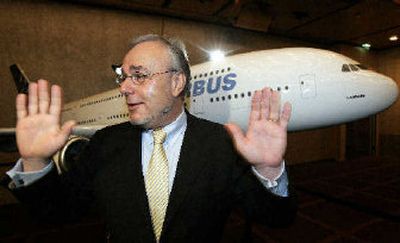Surge keeps Airbus No. 1 in orders

PARIS — A December sales surge kept Airbus on top of the global passenger jet market in 2005, the company said Tuesday — bettering Boeing Co.’s orders and deliveries.
But Airbus conceded it had lost ground to Boeing in the market for larger, more profitable planes and with it, the race for highest order value. It also said it plans to review its A340 jet in the wake of disappointing sales.
Airbus announced 1,055 net orders for 2005, beating its U.S. rival’s 1,002, and delivered 378 airliners to Boeing’s 290. Excluding cancellations, the Airbus tally came to 1,111 orders, the largest number ever booked either side of the Atlantic.
The Airbus figures defied predictions that the European plane maker would lose the lead in orders it took from Boeing in 2001, two years before pulling ahead on deliveries. In the 11 months to Nov. 30, Airbus had reported 687 firm orders.
“We had a very busy December,” Airbus Chief Executive Gustav Humbert said at a briefing before Tuesday’s announcement.
The final figures include a late surge of order confirmations for single-aisle A320 models. China bought 150 of the jets during a visit to Paris last month by Prime Minister Wen Jiabao — upstaging a Boeing deal the previous month to sell 70 737s to China.
In longer-range, widebody planes, however, it is Airbus that has struggled to keep up. Boeing sold 455 such jets last year, representing 44 percent of its total orders, while Airbus took orders for 193 of its larger planes, or 17 percent of its total.
As a result, Boeing won the larger share of the overall market by order value in 2005, Humbert said. “As far as we see it, Boeing has 55 percent in value and we have 45 percent in value, although we are leading in the number of aircraft,” he said.
In 2004, Airbus won 54 percent of global new orders by value, according to the company’s own figures. The average catalog price for a single-aisle Airbus A320 or Boeing 737 is close to $60 million, less than a third of the average list price for the A340 or 777 — which also carry higher profit margins.
Humbert also signaled a review of the A340, a four-engine jet that flies 380 passengers up to 7,500 nautical miles in the largest of its three versions. The A340 attracted only 15 firm orders in 2005, while Boeing won 154 orders for its competing twin-engine 777s.
“We can and will do better in the long-range field,” Humbert said, without specifying what changes were under consideration. “If we think something has to be done then I will act very quickly, but nothing is on the table,” he said.
Airbus has sold the A340 as a safer bet for long-haul flights over remote areas like the North Pole, arguing that a four-engined plane is better able to cope with an engine failure and fly on to a safe landing elsewhere. But rising oil prices are making the economics of more efficient twin-engined planes difficult to ignore — and Boeing is rubbing its hands.
“When fuel prices are so high, there’s no way Airbus can price an inefficient airplane attractively for customers,” said Randy Tinseth, director of product and services marketing for Boeing’s commercial jet division.